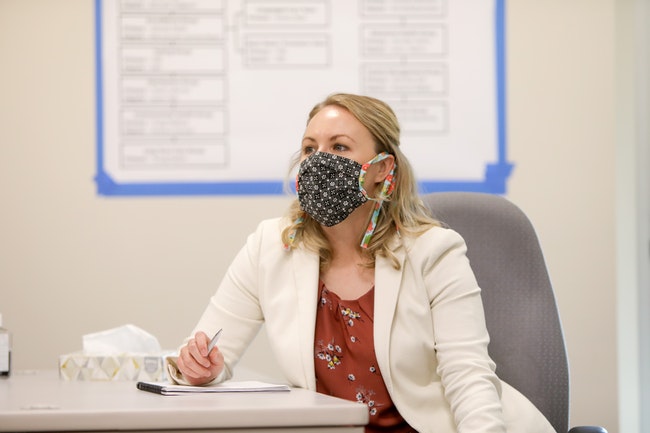
Katrina Rothenberger, incident commander at the Marion County Health and Human Services COVID-19 incident command works in the office on July 13, 2020. (Amanda Loman/Salem Reporter)
Starting this week, Marion County residents who test positive for Covid will most likely not get a call from the health department.
That’s unless they spend time in settings where they’re at higher risk of contracting Covid, such as schools, long-term care facilities, daycares or correctional facilities, said Katrina Rothenberger, Marion County’s public health director.
With the omicron surge sweeping the Salem area and the rest of the state, Rothenberger said county public health officials expect cases to keep climbing for another week or two, and continuing to investigate every positive test would be “the wrong public health intervention.”
“It will completely overwhelm our staff. Basically Covid, omicron is everywhere,” Rothenberger said in an interview with Salem Reporter.
County health officials are instead shifting their priorities to limiting the spread of Covid in high-risk settings, getting people five and older vaccinated and boosted, and testing. “Our public health health goal now is to prevent severe disease and death,” she said.
The switch comes after Marion County’s daily Covid case count ballooned over the past two weeks. After a December where cases didn’t rise above 127, they grew to about 500 on Jan. 6 before spiking to 1,286 within a day, Oregon Health Authority data showed. Cases hit 1,366 by Jan. 10, dropped to 611 the next day and then remained near 800 through Jan. 14.
(Graph by Ardeshir Tabrizian/Salem Reporter)
Between Jan. 10-14, the number of Salem Hospital patients with Covid ranged from 73 to 84, according to hospital data.
Rothenberger said county health officials expect the peak in cases to be “pretty soon” and hospitalizations, which typically lag, will peak at the end of January. “We should be on the downside of omicron a lot faster than with delta,” she said.
Previously, the public health department would do contact tracing, which requires contacting people who may have been exposed to someone who tested positive. Marion County stopped contact tracing during the summer delta surge and instead focused on case investigations, which entails helping people who test positive remember everyone they had close contact with after contracting Covid.
She said the department now has teams that focus on investigations for a specific high-risk setting.
Given how quickly the omicron variant spreads and the CDC recently shortening their recommended isolation period to five days, Rothenberger said it’s important that schools spend less time entering data, and more time identifying Covid-positive people and making sure they – as well as close contacts – are excluded from schools as soon as possible.
“We know that test supplies are extremely limited right now,” she said.
The state ordered 6 million at-home test kits in December from iHealth labs, with a total 12 million rapid tests. As of Thursday, they’ve received just under 1 million kits with 2 million tests, which won’t be distributed to the general public, said Pat Allen, director of the Oregon Health Authority, in a Thursday afternoon news conference. Those kits will mostly go to institutions like hospitals, schools and other high-risk facilities. Allen said they expect to receive the rest by the end of January.
Rothenberger said county officials are planning to quickly distribute at-home kits when they’re available to community organizations that can distribute them to people who lack traditional access to testing and may be more vulnerable to severe impacts from Covid.
“I think everybody deserves testing, everybody needs at-home kits. It’s a really important tool in our toolbox right now that helps us make decisions about ourselves and our families, but it’s just not available right now,” Rothenberger said.
In the meantime, she said people should try to stay home as much as possible. “Try not to go venture out and try and find a test unless it’s absolutely necessary, or you’re feeling really ill,” she said. “We’re trying to discourage employers from requiring tests to return to work, because there’s just not enough available.”
“As long as people have their five days of isolation, they’re 24 hours fever-free and their symptoms are generally improving then they can return to work,” she said. “We really need to save these tests for people who absolutely need them and may need therapeutics.”
Rothenberger also said people who feel mild symptoms should still assume they have Covid. “We don’t want colds circulating either, because the symptoms look very similar to Covid. And without testing, we won’t know and people may be excluded from work or school just based on symptoms alone,” she said. “Omicron is more mild, but it’s also not fun. I know more and more people who are getting omicron these days, and they have body aches, they don’t feel well enough to go to work even though the symptoms are mild.”
She also said people going out in public or into high-risk settings should wear a KN95 mask or double up on surgical or cloth masks, and cloth masks should be washed daily.
This story was updated to add context to a statement from Katrina Rothenberger about returning to work after feeling ill.
Contact reporter Ardeshir Tabrizian: [email protected] or 503-929-3053.
JUST THE FACTS, FOR SALEM – We report on your community with care and depth, fairness and accuracy. Get local news that matters to you. Subscribe to Salem Reporter starting at $5 a month. Click I want to subscribe!









